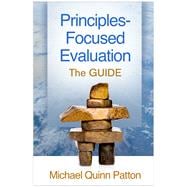How can programs and organizations ensure they are adhering to core principles--and assess whether doing so is yielding desired results? From evaluation pioneer Michael Quinn Patton, this book introduces the principles-focused evaluation (P-FE) approach and demonstrates its relevance and application in a range of settings. Patton explains why principles matter for program development and evaluation and how they can serve as a rudder to navigate the uncertainties, turbulence, and emergent challenges of complex dynamic environments. In-depth exemplars illustrate how the unique GUIDE framework is used to determine whether principles provide meaningful guidance (G) and are useful (U), inspiring (I), developmentally adaptable (D), and evaluable (E). User-friendly features include rubrics, a P-FE checklist, firsthand reflections and examples from experienced P-FE practitioners, sidebars and summary tables, and end-of-chapter application exercises.








